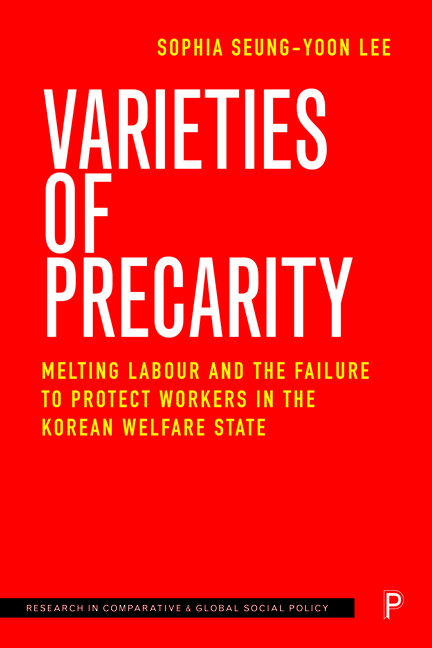 Varieties of Precarity
Varieties of Precarity Book contents
- Frontmatter
- Contents
- Series editors’ preface
- List of figures and tables
- Acknowledgements
- 1 Introduction: Melting labour and institutional inconsistency
- 2 Social protection policies and the South Korean labour market in comparative perspective
- 3 When insiders are kicked out: layoffs of regular workers in manufacturing
- 4 Same boat, different destiny: subcontracted workers in the Korean shipbuilding industry
- 5 Young and old outsourced female workers in call centres and cleaning services
- 6 Are freelancers really free? The Korean freelance labour market and the precarity of young freelancers
- 7 The digital precariat: various Korean platform workers and the new work logic
- 8 Conclusion: Towards universal institutional protection for precarious workers in the era of melting labour
- Notes
- References
- Index
8 - Conclusion: Towards universal institutional protection for precarious workers in the era of melting labour
Published online by Cambridge University Press: 03 April 2024
- Frontmatter
- Contents
- Series editors’ preface
- List of figures and tables
- Acknowledgements
- 1 Introduction: Melting labour and institutional inconsistency
- 2 Social protection policies and the South Korean labour market in comparative perspective
- 3 When insiders are kicked out: layoffs of regular workers in manufacturing
- 4 Same boat, different destiny: subcontracted workers in the Korean shipbuilding industry
- 5 Young and old outsourced female workers in call centres and cleaning services
- 6 Are freelancers really free? The Korean freelance labour market and the precarity of young freelancers
- 7 The digital precariat: various Korean platform workers and the new work logic
- 8 Conclusion: Towards universal institutional protection for precarious workers in the era of melting labour
- Notes
- References
- Index
Summary
Melting labour and the variety of precarious workers
The concept of melting labour served as the analytical prism throughout the book to establish the contours of emerging precarious workers and their variety. The book focused on melting labour as companies and capital evolved the capital accumulation mode alongside technological development. The issues observed in newly expanding forms of work overlapped with the Korean labour market, such as platform work, freelancers and other long-standing issues related to non-regular workers and precarious selfemployed workers. The new non-standard forms of work went beyond the departure from the standard ‘employment relationship’, and the forms of work were changing in ways that differed from existing standards. However, the precariousness issues associated with these types of work were consistent with those discussed thus far for non-regular workers. The longstanding problems of non-regular workers and those brought about by the emerging ‘form’ of work needed to be explored from a comprehensive and integrated perspective.
In this book I presented a comprehensive analysis of the intersections between institutional protection and melting labour in the Korean context, utilising a theoretical framework that categorises precarious workers based on their level of institutional protection and melting labour. The specific case studies in this book illustrate the experiences of precarious workers in Korea, including the process by which regular workers can fall into precarious work, the disparities between the subcontracting labour market and social safety net, the concentration of female workers in precarious forms of work, and the challenges faced by freelancers and platform workers. The studies utilised qualitative research methods, including in-depth interviews and case study analyses, to provide a detailed account of the implications of institutional protection and melting labour for precarious work in Korea.
Precarity is closely tied to workers’ experience of uncertainty, as they are unable to predict the future and lack control over it. Unlike risk, which can be measured and addressed through public and private management programmes, uncertainty poses a sunk cost to human capital and income irregularity can complicate future planning and diminish workers’ control over their lives. Melting labour is a concept that describes the diverse types of work and workplaces that blur the boundaries of traditional ‘standard’ work, particularly formed during times of industrialisation.
- Type
- Chapter
- Information
- Varieties of PrecarityMelting Labour and the Failure to Protect Workers in the Korean Welfare State, pp. 162 - 174Publisher: Bristol University PressPrint publication year: 2023
